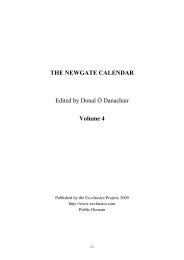PDF format (1.55 Mb) - The Ex-Classics Web Site
PDF format (1.55 Mb) - The Ex-Classics Web Site
PDF format (1.55 Mb) - The Ex-Classics Web Site
You also want an ePaper? Increase the reach of your titles
YUMPU automatically turns print PDFs into web optimized ePapers that Google loves.
THE ANATOMY OF MELANCHOLY<br />
that are sick, without a cause, even when they will themselves, upon every toy or small<br />
discontent, and when he comes, they make it worse than it is, by amplifying that which is not.<br />
Hier. Capivaccius sets it down as a common fault of all "melancholy persons to say their<br />
symptoms are greater than they are, to help themselves." And which Mercurialis notes, consil.<br />
53. "to be more troublesome to their physicians, than other ordinary patients, that they may have<br />
change of physic."<br />
A third thing to be required in a patient, is confidence, to be of good cheer, and have sure<br />
hope that his physician can help him. Damascen the Arabian requires likewise in the physician<br />
himself, that he be confident he can cure him, otherwise his physic will not be effectual, and<br />
promise withal that he will certainly help him, make him believe so at least. Galeottus gives this<br />
reason, because the form of health is contained in the physician's mind, and as Galen, holds<br />
"confidence and hope to be more good than physic," he cures most in whom most are confident.<br />
Axiocus sick almost to death, at the very sight of Socrates recovered his former health.<br />
Paracelsus assigns it for an only cause, why Hippocrates was so fortunate in his cures, not for<br />
any extraordinary skill he had; but "because the common people had a most strong conceit of his<br />
worth." To this of confidence we may add perseverance, obedience, and constancy, not to change<br />
his physician, or dislike him upon every toy; for he that so doth (saith Janus Damascen) "or<br />
consults with many, falls into many errors; or that useth many medicines." It was a chief caveat<br />
of Seneca to his friend Lucilius, that he should not alter his physician, or prescribed physic:<br />
"Nothing hinders health more; a wound can never be cured, that hath several plasters." Crato<br />
consil. 186. taxeth all melancholy persons of this fault: "'Tis proper to them, if things fall not out<br />
to their mind, and that they have not present ease, to seek another and another;" (as they do<br />
commonly that have sore eyes) "twenty one after another, and they still promise all to cure them,<br />
try a thousand remedies; and by this means they increase their malady, make it most dangerous<br />
and difficult to be cured." "<strong>The</strong>y try many" (saith Montanus) "and profit by none:" and for this<br />
cause, consil. 24. he enjoins his patient before he take him in hand, "perseverance and<br />
sufferance, for in such a small time no great matter can be effected, and upon that condition he<br />
will administer physic, otherwise all his endeavour and counsel would be to small purpose." And<br />
in his 31. counsel for a notable matron, he tells her, "if she will be cured, she must be of a most<br />
abiding patience, faithful obedience, and singular perseverance; if she remit, or despair, she can<br />
expect or hope for no good success." Consil. 230. for an Italian Abbot, he makes it one of the<br />
greatest reasons why this disease is so incurable, "because the parties are so restless, and<br />
impatient, and will therefore have him that intends to be eased," "to take physic, not for a month,<br />
a year, but to apply himself to their prescriptions all the days of his life." Last of all, it is required<br />
that the patient be not too bold to practise upon himself, without an approved physician's<br />
consent, or to try conclusions, if he read a receipt in a book; for so, many grossly mistake, and do<br />
themselves more harm than good. That which is conducing to one man, in one case, the same<br />
time is opposite to another. An ass and a mule went laden over a brook, the one with salt, the<br />
other with wool: the mule's pack was wet by chance, the salt melted, his burden the lighter, and<br />
he thereby much eased: he told the ass, who, thinking to speed as well, wet his pack likewise at<br />
the next water, but it was much the heavier, he quite tired. So one thing may be good and bad to<br />
several parties, upon diverse occasions. "Many things" (saith Penottus) "are written in our<br />
books, which seem to the reader to be excellent remedies, but they that make use of them are<br />
-24
















